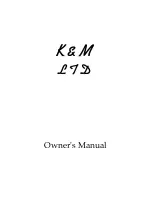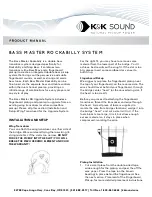
Top Panel Features
1.
INPUT Jack – Plug in your instrument here. The input can take a wide range of instrument
signal levels based on how you set the GAIN control.
2.
GAIN Control – Controls the amount of input signal to the amplifier. Turn this up for a soft
overdrive. NOTE: To reduce excessive noise, we recommend keeping the gain control at least
halfway up whenever possible.
3.
VOLUME Control – Controls the master volume of the amplifier.
4.
TONE Control – Turning the knob to the left will increase bass and decrease treble. Turning the
knob to the right will increase treble and decrease bass. Leave the knob centered for the most
neutral tone.
5.
AMBIENCE Control – A subtle effect that simulates the natural reflections of an open-back
guitar cabinet.
6.
Pilot Light – LED that indicates the amplifier is on.
Rear Panel Features
7.
Speaker Out Jack – Use a ¼ inch (6.35mm) speaker cable to power an external speaker.
Minimum recommended speaker impedance is 8Ω.
8.
Headphone/Line Out Volume Control – Controls the volume of the Headphone/Line Out jack.
9.
Headphone/Line Out Jack – Stereo ¼ inch (6.35 mm) jack to drive headphones or send a line
out to monitoring or recording equipment. Use the Headphone/Line Out Volume Control to
adjust the signal level.
10.
Internal Speaker Switch – Turns on or off the internal 6.5 inch (165 mm) speaker. Use this
for quiet practicing with headphones or for using the Lunchbox solely as a head to power an
external cabinet. The Lunchbox is designed to be able to power the internal speaker and an
external cabinet simultaneously.
11.
Aux Input – Stereo ⅛
inch (3.5 mm) input for music or other audio. The GAIN control has no
effect on this signal but VOLUME, TONE, and AMBIENCE all do.
12.
Power Switch – Turns the Lunchbox on or off.
13.
Fuse – Protects the amplifier from electrical faults. Always replace with the correct fuse type as
indicated on rear panel.
14.
AC Power Jack – Plug in your detachable AC power cable here.
15.
Voltage selector – To select between the mains voltages of different electrical systems. Check
to make sure this is set correctly before you use your amplifier and contact your dealer or
ZT Amplifiers directly if you have any questions. Setting the voltage incorrectly will cause
permanent damage to the amplifier.

























